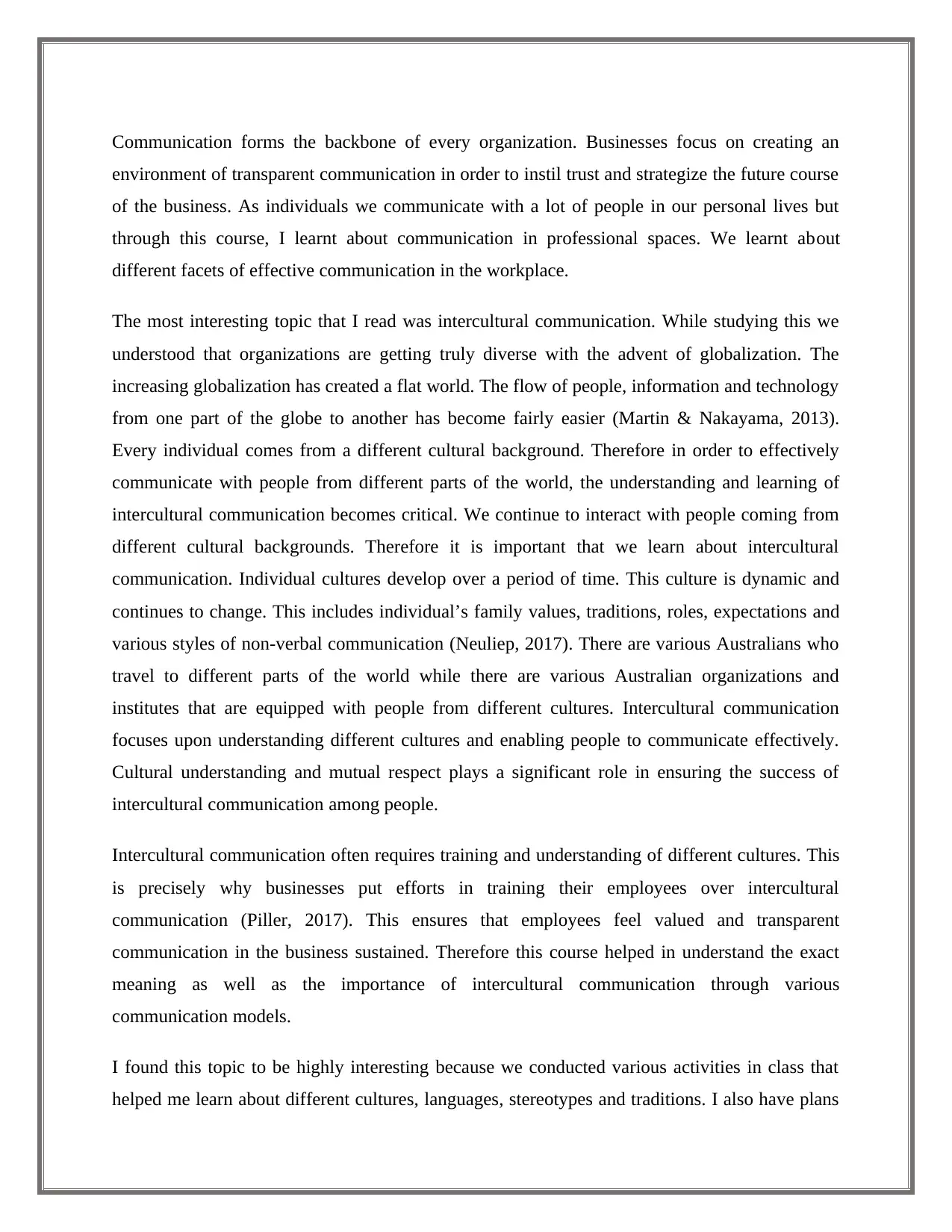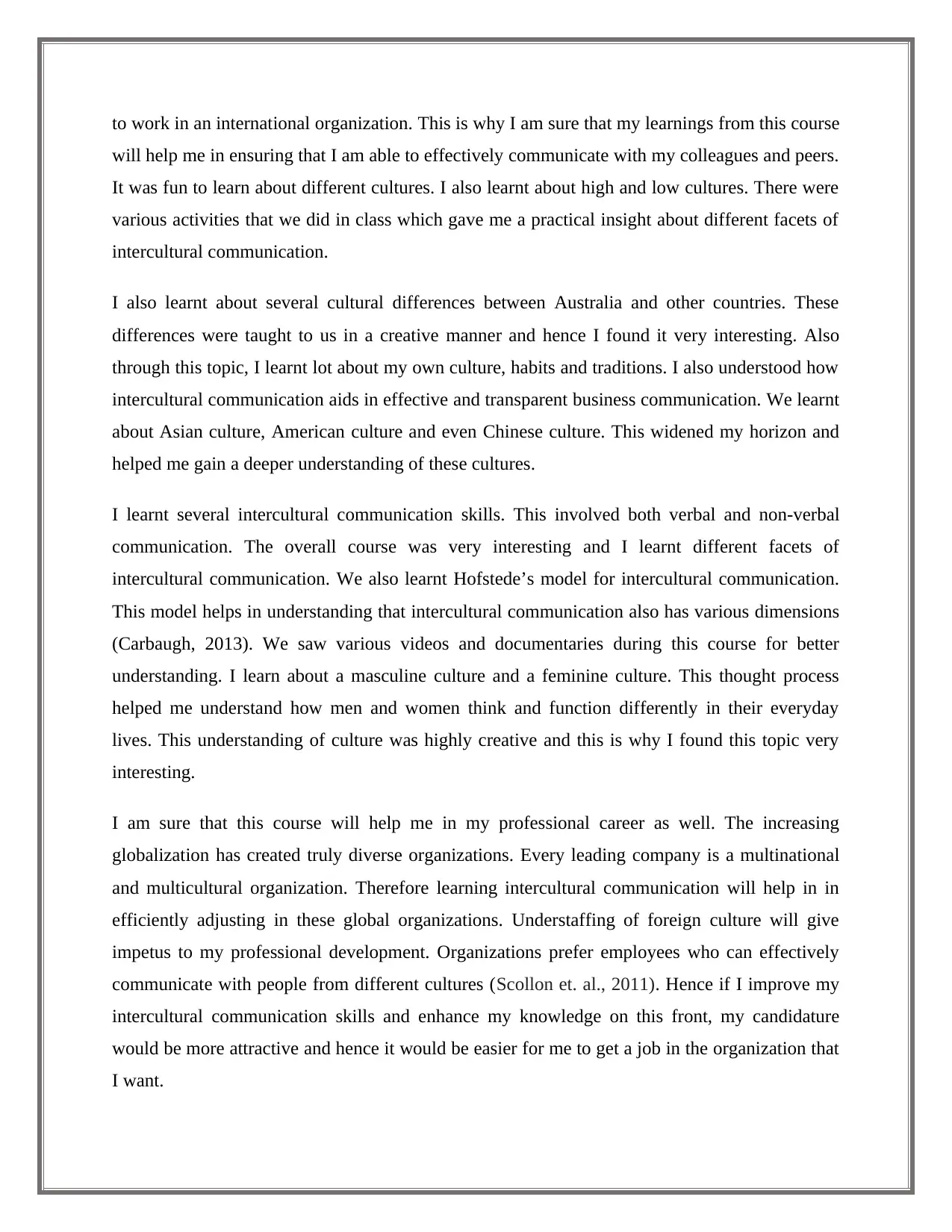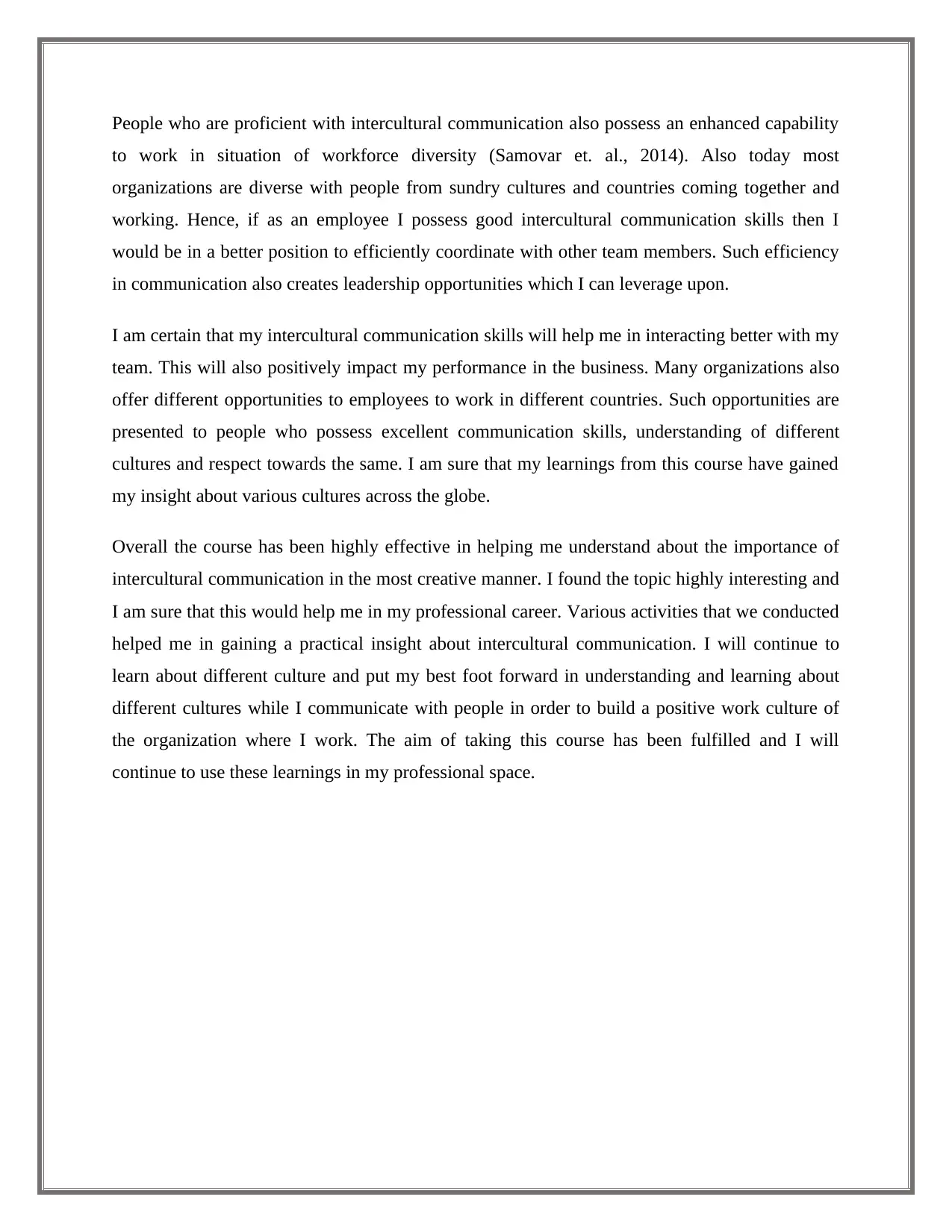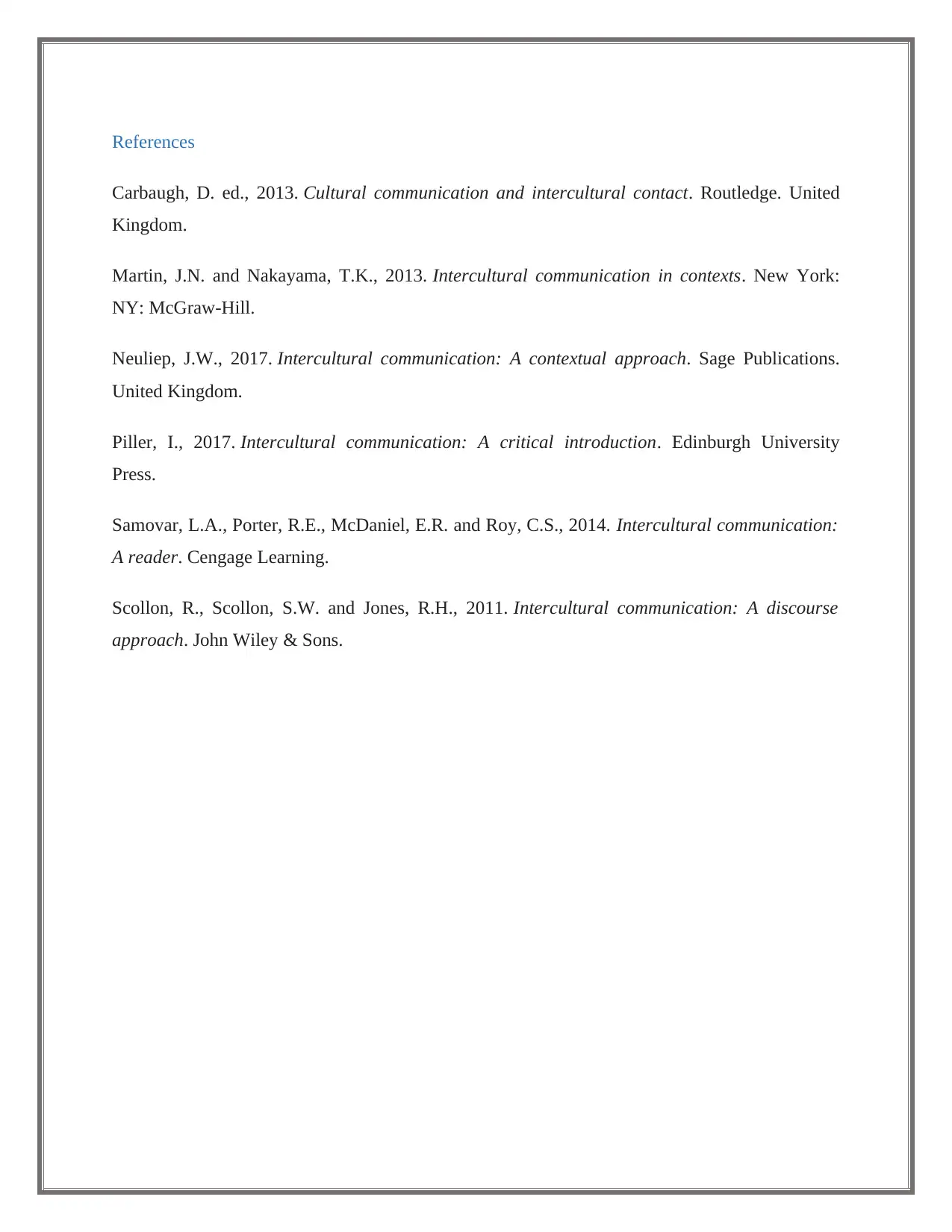EAPM4000 Professional Communication: Intercultural Reflection
VerifiedAdded on 2023/06/11
|5
|1239
|413
Report
AI Summary
This report is a student's structured reflection on intercultural communication, a topic from the Professional Communication Practice course (EAPM4000). It describes the concept of intercultural communication, emphasizing its importance in today's globalized workplaces. The reflection highlights the student's interest in the topic due to its relevance to future career aspirations in international organizations. It also discusses how understanding different cultures, verbal and non-verbal communication nuances, and models like Hofstede's, contribute to effective communication and leadership opportunities. The student reflects on how the course activities provided practical insights and enhanced their understanding of cultural differences, ultimately aiming to apply these learnings to foster positive work environments.

Professional communication practice
Reflection
Reflection
Paraphrase This Document
Need a fresh take? Get an instant paraphrase of this document with our AI Paraphraser

Communication forms the backbone of every organization. Businesses focus on creating an
environment of transparent communication in order to instil trust and strategize the future course
of the business. As individuals we communicate with a lot of people in our personal lives but
through this course, I learnt about communication in professional spaces. We learnt about
different facets of effective communication in the workplace.
The most interesting topic that I read was intercultural communication. While studying this we
understood that organizations are getting truly diverse with the advent of globalization. The
increasing globalization has created a flat world. The flow of people, information and technology
from one part of the globe to another has become fairly easier (Martin & Nakayama, 2013).
Every individual comes from a different cultural background. Therefore in order to effectively
communicate with people from different parts of the world, the understanding and learning of
intercultural communication becomes critical. We continue to interact with people coming from
different cultural backgrounds. Therefore it is important that we learn about intercultural
communication. Individual cultures develop over a period of time. This culture is dynamic and
continues to change. This includes individual’s family values, traditions, roles, expectations and
various styles of non-verbal communication (Neuliep, 2017). There are various Australians who
travel to different parts of the world while there are various Australian organizations and
institutes that are equipped with people from different cultures. Intercultural communication
focuses upon understanding different cultures and enabling people to communicate effectively.
Cultural understanding and mutual respect plays a significant role in ensuring the success of
intercultural communication among people.
Intercultural communication often requires training and understanding of different cultures. This
is precisely why businesses put efforts in training their employees over intercultural
communication (Piller, 2017). This ensures that employees feel valued and transparent
communication in the business sustained. Therefore this course helped in understand the exact
meaning as well as the importance of intercultural communication through various
communication models.
I found this topic to be highly interesting because we conducted various activities in class that
helped me learn about different cultures, languages, stereotypes and traditions. I also have plans
environment of transparent communication in order to instil trust and strategize the future course
of the business. As individuals we communicate with a lot of people in our personal lives but
through this course, I learnt about communication in professional spaces. We learnt about
different facets of effective communication in the workplace.
The most interesting topic that I read was intercultural communication. While studying this we
understood that organizations are getting truly diverse with the advent of globalization. The
increasing globalization has created a flat world. The flow of people, information and technology
from one part of the globe to another has become fairly easier (Martin & Nakayama, 2013).
Every individual comes from a different cultural background. Therefore in order to effectively
communicate with people from different parts of the world, the understanding and learning of
intercultural communication becomes critical. We continue to interact with people coming from
different cultural backgrounds. Therefore it is important that we learn about intercultural
communication. Individual cultures develop over a period of time. This culture is dynamic and
continues to change. This includes individual’s family values, traditions, roles, expectations and
various styles of non-verbal communication (Neuliep, 2017). There are various Australians who
travel to different parts of the world while there are various Australian organizations and
institutes that are equipped with people from different cultures. Intercultural communication
focuses upon understanding different cultures and enabling people to communicate effectively.
Cultural understanding and mutual respect plays a significant role in ensuring the success of
intercultural communication among people.
Intercultural communication often requires training and understanding of different cultures. This
is precisely why businesses put efforts in training their employees over intercultural
communication (Piller, 2017). This ensures that employees feel valued and transparent
communication in the business sustained. Therefore this course helped in understand the exact
meaning as well as the importance of intercultural communication through various
communication models.
I found this topic to be highly interesting because we conducted various activities in class that
helped me learn about different cultures, languages, stereotypes and traditions. I also have plans

to work in an international organization. This is why I am sure that my learnings from this course
will help me in ensuring that I am able to effectively communicate with my colleagues and peers.
It was fun to learn about different cultures. I also learnt about high and low cultures. There were
various activities that we did in class which gave me a practical insight about different facets of
intercultural communication.
I also learnt about several cultural differences between Australia and other countries. These
differences were taught to us in a creative manner and hence I found it very interesting. Also
through this topic, I learnt lot about my own culture, habits and traditions. I also understood how
intercultural communication aids in effective and transparent business communication. We learnt
about Asian culture, American culture and even Chinese culture. This widened my horizon and
helped me gain a deeper understanding of these cultures.
I learnt several intercultural communication skills. This involved both verbal and non-verbal
communication. The overall course was very interesting and I learnt different facets of
intercultural communication. We also learnt Hofstede’s model for intercultural communication.
This model helps in understanding that intercultural communication also has various dimensions
(Carbaugh, 2013). We saw various videos and documentaries during this course for better
understanding. I learn about a masculine culture and a feminine culture. This thought process
helped me understand how men and women think and function differently in their everyday
lives. This understanding of culture was highly creative and this is why I found this topic very
interesting.
I am sure that this course will help me in my professional career as well. The increasing
globalization has created truly diverse organizations. Every leading company is a multinational
and multicultural organization. Therefore learning intercultural communication will help in in
efficiently adjusting in these global organizations. Understaffing of foreign culture will give
impetus to my professional development. Organizations prefer employees who can effectively
communicate with people from different cultures (Scollon et. al., 2011). Hence if I improve my
intercultural communication skills and enhance my knowledge on this front, my candidature
would be more attractive and hence it would be easier for me to get a job in the organization that
I want.
will help me in ensuring that I am able to effectively communicate with my colleagues and peers.
It was fun to learn about different cultures. I also learnt about high and low cultures. There were
various activities that we did in class which gave me a practical insight about different facets of
intercultural communication.
I also learnt about several cultural differences between Australia and other countries. These
differences were taught to us in a creative manner and hence I found it very interesting. Also
through this topic, I learnt lot about my own culture, habits and traditions. I also understood how
intercultural communication aids in effective and transparent business communication. We learnt
about Asian culture, American culture and even Chinese culture. This widened my horizon and
helped me gain a deeper understanding of these cultures.
I learnt several intercultural communication skills. This involved both verbal and non-verbal
communication. The overall course was very interesting and I learnt different facets of
intercultural communication. We also learnt Hofstede’s model for intercultural communication.
This model helps in understanding that intercultural communication also has various dimensions
(Carbaugh, 2013). We saw various videos and documentaries during this course for better
understanding. I learn about a masculine culture and a feminine culture. This thought process
helped me understand how men and women think and function differently in their everyday
lives. This understanding of culture was highly creative and this is why I found this topic very
interesting.
I am sure that this course will help me in my professional career as well. The increasing
globalization has created truly diverse organizations. Every leading company is a multinational
and multicultural organization. Therefore learning intercultural communication will help in in
efficiently adjusting in these global organizations. Understaffing of foreign culture will give
impetus to my professional development. Organizations prefer employees who can effectively
communicate with people from different cultures (Scollon et. al., 2011). Hence if I improve my
intercultural communication skills and enhance my knowledge on this front, my candidature
would be more attractive and hence it would be easier for me to get a job in the organization that
I want.
⊘ This is a preview!⊘
Do you want full access?
Subscribe today to unlock all pages.

Trusted by 1+ million students worldwide

People who are proficient with intercultural communication also possess an enhanced capability
to work in situation of workforce diversity (Samovar et. al., 2014). Also today most
organizations are diverse with people from sundry cultures and countries coming together and
working. Hence, if as an employee I possess good intercultural communication skills then I
would be in a better position to efficiently coordinate with other team members. Such efficiency
in communication also creates leadership opportunities which I can leverage upon.
I am certain that my intercultural communication skills will help me in interacting better with my
team. This will also positively impact my performance in the business. Many organizations also
offer different opportunities to employees to work in different countries. Such opportunities are
presented to people who possess excellent communication skills, understanding of different
cultures and respect towards the same. I am sure that my learnings from this course have gained
my insight about various cultures across the globe.
Overall the course has been highly effective in helping me understand about the importance of
intercultural communication in the most creative manner. I found the topic highly interesting and
I am sure that this would help me in my professional career. Various activities that we conducted
helped me in gaining a practical insight about intercultural communication. I will continue to
learn about different culture and put my best foot forward in understanding and learning about
different cultures while I communicate with people in order to build a positive work culture of
the organization where I work. The aim of taking this course has been fulfilled and I will
continue to use these learnings in my professional space.
to work in situation of workforce diversity (Samovar et. al., 2014). Also today most
organizations are diverse with people from sundry cultures and countries coming together and
working. Hence, if as an employee I possess good intercultural communication skills then I
would be in a better position to efficiently coordinate with other team members. Such efficiency
in communication also creates leadership opportunities which I can leverage upon.
I am certain that my intercultural communication skills will help me in interacting better with my
team. This will also positively impact my performance in the business. Many organizations also
offer different opportunities to employees to work in different countries. Such opportunities are
presented to people who possess excellent communication skills, understanding of different
cultures and respect towards the same. I am sure that my learnings from this course have gained
my insight about various cultures across the globe.
Overall the course has been highly effective in helping me understand about the importance of
intercultural communication in the most creative manner. I found the topic highly interesting and
I am sure that this would help me in my professional career. Various activities that we conducted
helped me in gaining a practical insight about intercultural communication. I will continue to
learn about different culture and put my best foot forward in understanding and learning about
different cultures while I communicate with people in order to build a positive work culture of
the organization where I work. The aim of taking this course has been fulfilled and I will
continue to use these learnings in my professional space.
Paraphrase This Document
Need a fresh take? Get an instant paraphrase of this document with our AI Paraphraser

References
Carbaugh, D. ed., 2013. Cultural communication and intercultural contact. Routledge. United
Kingdom.
Martin, J.N. and Nakayama, T.K., 2013. Intercultural communication in contexts. New York:
NY: McGraw-Hill.
Neuliep, J.W., 2017. Intercultural communication: A contextual approach. Sage Publications.
United Kingdom.
Piller, I., 2017. Intercultural communication: A critical introduction. Edinburgh University
Press.
Samovar, L.A., Porter, R.E., McDaniel, E.R. and Roy, C.S., 2014. Intercultural communication:
A reader. Cengage Learning.
Scollon, R., Scollon, S.W. and Jones, R.H., 2011. Intercultural communication: A discourse
approach. John Wiley & Sons.
Carbaugh, D. ed., 2013. Cultural communication and intercultural contact. Routledge. United
Kingdom.
Martin, J.N. and Nakayama, T.K., 2013. Intercultural communication in contexts. New York:
NY: McGraw-Hill.
Neuliep, J.W., 2017. Intercultural communication: A contextual approach. Sage Publications.
United Kingdom.
Piller, I., 2017. Intercultural communication: A critical introduction. Edinburgh University
Press.
Samovar, L.A., Porter, R.E., McDaniel, E.R. and Roy, C.S., 2014. Intercultural communication:
A reader. Cengage Learning.
Scollon, R., Scollon, S.W. and Jones, R.H., 2011. Intercultural communication: A discourse
approach. John Wiley & Sons.
1 out of 5
Related Documents
Your All-in-One AI-Powered Toolkit for Academic Success.
+13062052269
info@desklib.com
Available 24*7 on WhatsApp / Email
![[object Object]](/_next/static/media/star-bottom.7253800d.svg)
Unlock your academic potential
Copyright © 2020–2026 A2Z Services. All Rights Reserved. Developed and managed by ZUCOL.





